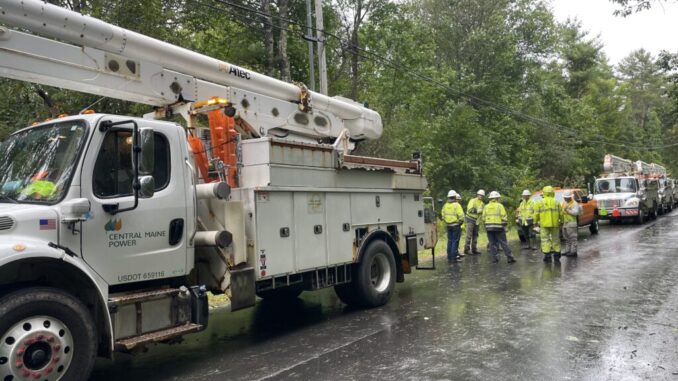
This article was originally published by the Maine Morning Star.
Following the defeat of a ballot measure that sought to replace Central Maine Power (CMP) and Versant with a consumer-owned power company, policymakers and advocates are looking to explore other ways of further regulating and improving service by the state’s primary utilities.
One possible path forward is legislation being put forward by Rep. Gerry Runte, a Democrat from York and a member of the Energy, Utilities and Technology Committee. While there is no specific text yet for that measure, Runte said in an interview that the idea behind the bill is to create additional accountability metrics as a way to spur better service from CMP and Versant.
Such legislation would build on a measure approved by lawmakers and signed by Gov. Janet Mills in 2022 that requires the Public Utilities Commission (PUC) to adopt rules for CMP and Versant that include quantitative metrics around service quality, customer service, field service, and interconnection of smaller scale electricity sources, and creates a report card for utilities.
Runte is still working out the exact details of the new bill. But he said the idea behind the measure is to direct the PUC to initiate a proceeding to broaden and enhance performance-based metrics for the utilities, establishing additional objectives for them to meet. The utilities could then get financially rewarded if they meet the targets or be penalized if they don’t. Runte said the bill would also direct the PUC to consider performance-based mechanisms being used in other states and create a group within the commission to implement the measure, adding three people to the PUC’s staff.
“I’m going to be working with the PUC staff to develop language that certainly compliments the work that they’ve already done in putting together the metrics for the original bill,” Runte said, referencing the 2022 measure.
“None of this stuff happens quickly or overnight,” he added. “You really have to take great care.”
Runte said he proposed a similar idea last session but that it was defeated, in part, because some lawmakers supportive of the referendum to replace CMP and Versant with a consumer-owned utility sunk the measure.
That referendum — which would have created the Pine Tree Power Company as Maine’s primary electricity provider — was spurred by the unpopularity of CMP and Versant, concerns about the service provided by those companies and opposition to their for-profit business model. However, Mainers voted down the ballot measure in November amid a deluge of spending against the proposal.
Pine Tree Power, the group that ran that campaign, declined to comment on Runte’s proposed legislation.
Runte said groups like Pine Tree Power have often been skeptical of proposals like his centered around performance metrics, also known as performance-based ratemaking (PBR). He said that opposition is not without reason, noting that earlier attempts at performance-based ratemaking sometimes backfired in part because utilities played too much of a role in designing the standards that they stood to benefit from.
However, Runte argued that the tide has turned in the last 10 to 15 years and that performance-based ratemaking is serving as an effective regulatory tool in states such as Hawaii, Minnesota and Connecticut.
Some advocates working on utility issues also say performance-based ratemaking can be an effective step toward incentivizing better service from CMP and Versant — if done right.
“There are a number of areas where a shift toward performance-based ratemaking is imperative,” said Rebecca Schultz of the Natural Resources Council of Maine — which backed the referendum to replace CMP and Versant — although she noted that it’s too soon to tell exactly how robust Runte’s bill will be.
Schultz noted that implementing effective performance-based ratemaking will take time because it requires high-quality data from the utility companies in order to evaluate their service. Obtaining such information, interpreting it and coming up with strong service benchmarks will take rigorous regulatory effort from the PUC, Schultz said. She added that she does worry the utility companies will “seek every opportunity to manipulate or provide low-quality data.”
“We need confident, strong and forceful competency at the Public Utilities Commission to make this work, and I think we need collaborative, creative, forthcoming leadership on the part of the utilities to partner and make this work,” she said.
Susan Faloon, spokesperson for the PUC, said she couldn’t comment on Runte’s bill until it is finalized. However, she said the commission has taken steps to incorporate performance metrics into its regulatory efforts and continues to implement previous legislation along those lines, such as the 2022 utility accountability bill.
CMP spokesperson Jonathan Breed also said he couldn’t comment on the bill without seeing the actual language. However, in response to the concern about the accessibility of utility data, he noted that as a matter of law, the company complies with all requests and orders from the PUC.
In her statement, Faloon also noted that the PUC recently ordered comprehensive service reliability metrics for CMP and Versant that could result in penalties if not met and added that the scorecard required by the 2022 bill will be provided to customers annually to help them “understand and assess their utility’s performance.”
Furthermore, Faloon said the two most recent rate cases for CMP and Versant include requirements to improve the resiliency and reliability of the grid as well as “the strictest service quality standards we have ever seen in a rate case, with built-in penalties if they are not met” and benchmarks that get more stringent over time.
When asked whether Versant would support the Runte’s general idea of creating additional performance-based metrics, company spokesperson Judy Long did not directly answer the question but noted that Versant is already regulated by strict performance metrics, has met those standards consistently since 2020 and has invested over $400 million since 2020 to improve reliability and service.
“We are up to the challenge of meeting service metrics that are aligned with our customers’ needs, as we have proven over the last several years, and we will continue to be mindful that our service must remain affordable for our customers,” Long said.
“Any adjustment to existing metrics and/or additional metrics to measure utility performance should be directly tied to supporting customer needs and to helping the state meet its energy policy goals, and should not be crafted in isolation,” she added.
Other advocates believe the idea of PBR has some potential. Matt Cannon, state conservation and energy director at the Sierra Club Maine — another group that supported the consumer-owned utility referendum — struck a tone similar to Schultz’s on the question of whether further PBR metrics would be effective.
“Generally, PBR is a useful tool, if implemented correctly,” he said. “It can incentivize utilities to act in a manner that is more aligned with the public’s interest. But the design is quite important, as it can lead to unintended consequences.”
Cannon gave the example of a potential situation in which a utility is incentivized to achieve cost savings but does so by eliminating its customer service department — an overall bad outcome for consumers.
Cannon added that utilities generally like performance metrics that are “easily achievable, so they end up getting some bonus, like an enhanced rate of return, for stuff they were already doing.”
Along with pushing for effective performance-based ratemaking, Schultz said there are additional reforms that could bolster the state’s utility system — arguing that the results of the November referendum do not represent a vindication of CMP and Versant’s performance and that there is still a significant need for service improvement.
Schultz cited a bill passed last session, sponsored by Runte, to study what it would mean to establish a distribution system operator in Maine. Such an operator, known as a DSO, would take authority away from Maine’s for-profit utilities when it comes to operating the grid and making strategic decisions, Schultz said. Under such a system, CMP and Versant would still own electrical poles and wires but decisions about how to run the grid and invest in it — as well as how to plan for the long-term — would be made by a quasi-governmental DSO.
The reform would do something similar to what Pine Tree Power was hoping to achieve by creating a consumer-owned utility — except that it wouldn’t mean actually buying out and fully replacing those companies, Schultz said.
Schultz also said she wants to see more protections put in place for low-income ratepayers, including designing residential solar programs and other clean energy transition initiatives with such Mainers in mind.
Finally, Schultz emphasized the continued importance of long-term grid planning so that the state’s power system can fully support and facilitate the transition to clean energy needed to combat the climate crisis.
“We need to be building to … enable the state to achieve the ambitious targets it has set out for itself,” she said.



